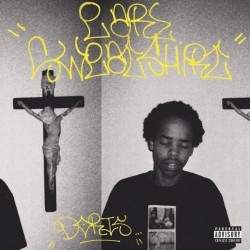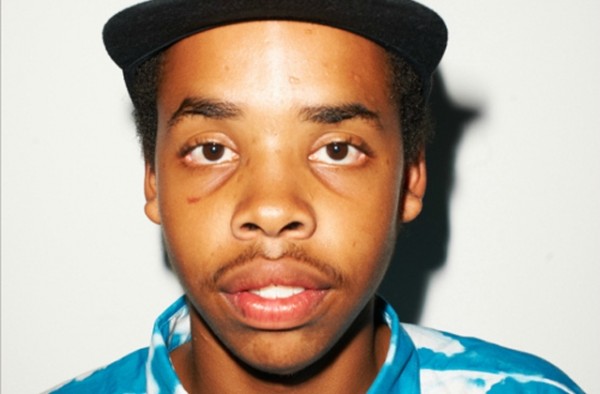CD Review: Hip Hop Phenom Earl Sweatshirt Delivers a Divine “Doris”
There was a great deal of obfuscatory hype about this LP, but the time to listen to the music has finally come. And Earl Sweatshirt has delivered what sounds like a hip hop classic.
Doris by Earl Sweatshirt. Columbia.
Tyler, the Creator, the founder of the notorious hip hop collective Odd Future, dropped his second studio effort, WOLF, earlier this year. The album minimized the violent, shocking themes of Tyler’s debut mixtape Bastard and his debut LP Goblin; instead, WOLF‘s lyrics skillfully balanced the musician’s brash, abrasive personality with affecting moments of brutally honest introspection. The album also featured some incredibly lush, often jazzy production and was intricately structured, notably its multi-character narrative set in a summer camp.
While WOLF had its fair share of brazen, juvenile moments, the LP was essentially an intriguing character study, making it one of the most ambitious hip hop albums in recent memory. Yet for all of its impressive merits, the album was largely overshadowed by the news that Earl Sweatshirt, the self-professed protégée of Tyler, the Creator, would be putting out his studio debut, entitled Doris, in a matter of months.
Earl turned a lot of heads in 2010 with his self-titled mixtape, whose lyrics dealt with drugs, rape, and murder—he was 16 at the time. The tape was a bit short-winded at under a half hour, but it was lauded by critics for Earl’s prodigious ability as an MC and the album’s eerie production, which should be credited to Tyler. Accordingly, Odd Future fans went into an uproar when Earl’s mother, because of the music’s dark themes, sent him to a boarding school in Samoa until his 18th birthday.
A “Free Earl” movement was launched, and the teenager is back, but thankfully he has returned with a different, more mature sensibility. When recording Doris, Earl says that he was “just trying to make pretty music. Those whose favorite song off Earl was “Epar” might be pretty bummed. Everyone with 666 or KTA or some sort of stupid hashtag like ‘hey look im crazy’ in their bio might be pretty bummed too. I anticipate a loss of fans. I also anticipate gaining some . . .”
There was a great deal of obfuscatory hype about this LP, but the time to listen to the music has finally come. And Earl has delivered what sounds like a hip hop classic—the beats, the lyrics, and the rapping are all absolutely sensational.
The record opens with “Pre,” and interestingly Earl opts not to take the first word; that distinction goes to SK La’ Flare, cousin of fellow Odd Future member and Grammy Award-winning R&B artist Frank Ocean. SK’s lengthy verse offers a smooth contrast to the dark, sauntering instrumental, and when Earl’s braggadocious verse arrives, it hits hard—it’s all the more powerful thanks to the wait.
However, nothing on the disc hits quite as hard as the beat of the following track, “Burgundy.” The song is only a brusque two minutes long, but it is driven by a thunderous arrangement of brass flourishes, organ swells, slick guitar notes, and a crashing drum kit. This soaring composition (courtesy of The Neptunes) backdrops Earl’s guilt-ridden verses, in which he laments that he could not spend more time with his dying grandmother because of the enormous pressure put on him to finish the album, which is named in her honor. Earl’s technical proficiency as an MC is again on display here, particularly when he speeds up his flow for his second verse.
Although “Burgundy” is an early, albeit awe-inspiring climax, every one of Doris’s 15 tracks could be considered a stand-out. “20 Wave Caps” is driven by some trippy, playful production from Samiyam and features a verse from Domo Genesis—a perfect fit given that weed is the song’s subject matter. But perhaps the greatest of the guest contributions is Frank Ocean’s on the song “Sundays.” As great of a singer he is, it is refreshing to hear him rapping again, and the way he rails against Chris Brown (who assaulted Ocean after calling him a “faggot”) via some very agile gay wordplay is fantastic.
The singles “Hive” and “Chum” follow—these are the album’s longest tracks at over four minutes each. Both have dark, atmospheric beats, but the former is driven by a spacious kick/snare sequence and rumbling bass, while the latter is characterized by sequenced piano, drum kit, and rippling bass. Both songs are accompanied by Hiro Murai-directed music videos whose macabre visuals match the music’s eerie esthetic. Earl’s production (credited under his “RandomBlackDude” moniker) is as ominous as the songs’ vocals and lyrics. Vince Staples’s inflection on “Hive” is particularly sinister, while “Chum” features Earl’s struggles with being fatherless.
After “Chum”’s extraordinary coda comes “Sasquatch,” to which Tyler, the Creator lends a delightfully obscene verse and some rattling, clanking production. Vince Staples contributes to another chilling track, “Centurion,” whose string-scraped beat borders on the avant-garde. Then comes the one-two punch of the brief instrumental interlude “523” and the pithy “Uncle Al”—both produced by Earl himself.
“Guild” is made up of a hazy, purposefully clumsy beat as well as druggy, low-pitched vocals from Earl and guest rapper Mac Miller. RZA of Wu-Tang fame lends the hook and old-school production to the breezy “Molasses.” Tyler, the Creator delivers an admittedly jarring rant at the beginning of the following track, “Whoa,” but his distinctively clunky instrumental style is welcome nonetheless.
Modern jazz trio BADBADNOTGOOD provide the backdrop for the LP’s epic track “Hoarse,” which is second only to “Burgundy” in terms of its raw power. The trio’s performance, particularly the twangy guitar tone, smacks of a Western film score but with an electronic tinge. The brief pick-up at the end of the tune is heart-stopping—this is perhaps the only time when Earl is outshone on the album, though his raspy, hoarse inflection is never less than compelling.
The sparkling production on “Knight” provides a somewhat celebratory closing note for the album. Lyrically, Earl and returning guest Domo talk about their fatherless lives, but rather than wallowing in their unfortunate pasts, they boast about the success they’ve achieved without the help of a father figure. Still, Earl admits being unable to shake his chronic anxiety. After the ambiguous closing line, “So, searching for a way to state it right/ Young, black, and jaded, vision hazy strolling through the night,” the beat fades out and a fleeting, glistening synth texture ends the record.
With Doris, Earl has created an album that can be appreciated beyond its overhyped backstory. It is a thrilling achievement in hip hop music—every instrumental is forward-thinking and fully-developed; the lyrics skillfully balance maturity and juvenility, realism and poetry. Earl has improved as an MC while proving himself to be an able producer as well. Doris proffers a magnificent tribute to its namesake.


